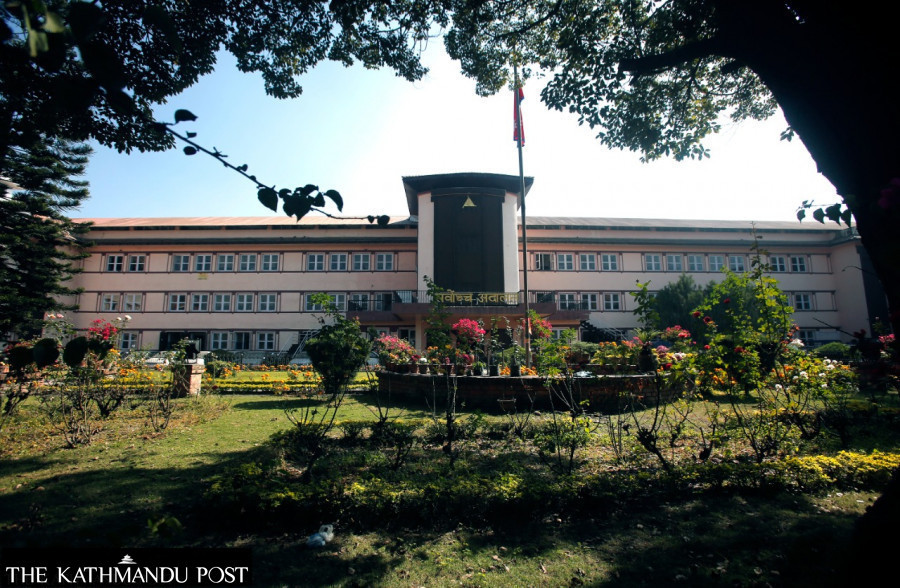National
Top court overturns 2017 acquittals in Unity Life fraud
Unity Life International, a pyramid scheme, had swindled Rs3.79 billion from 368,710 people 15 years ago.
Binod Ghimire
Reversing the verdict of the Patan High Court, the Supreme Court has convicted seven managers of the Unity Life International (ULI), 15 years after the multi-billion-rupee scam came to light.
A division bench of Chief Justice Prakash Man Singh Raut and Justice Til Prasad Shrestha convicted its chairperson Kashiram Gurung and others, and sentenced them with imprisonment and fines.
Along with Kashiram, directors Bhim Bahadur Gurung, Indra Bahadur Bishwakarma, Netra Rajbanshi, Krishna Bahadur Kshetri, Mahendra KC and Bishnu Bahadur Kshetri have been sentenced to two and a half years in prison and Rs25,000 in fines each. Kshetri, however, has passed away.
According to Achyut Kuikel, the court’s spokesperson, ULI’s general manager Shishir Yogi and director Bishwanath Gautam have each been handed down a sentence of a year’s imprisonment and fined Rs10,000. The division bench has also decided to refund victims’ deposits by liquidating the properties under the ULI’s possession.
The Judgement Implementation Directorate, under the top court, will publish notices calling on depositors to claim their money. Once claims are calculated, ULI’s assets will be liquidated to refund them. “A deputy director from the Judgement Implementation Directorate has been assigned to oversee the refund process,” Kuikel told the Post.
ULI had swindled Rs3.79 billion from 368,710 people both within the country and overseas, offering two illegal “assurance” and health schemes, according to the probe report. ULI used a pyramid-style business by recruiting a few individuals, who in turn recruited others, with promises of profit.
Following complaints and media reports about the dubious business, the government in 2010 started an investigation after raiding ULI’s Jawalakhel-based office. The police filed cases against 112 individuals and had arrested 23 individuals in relation to the case.
The government had clamped down on ULI operations declaring its networking marketing business illegal in May 2010 and scrapped its registration.
Before the government ban, the ULI was running its network business offering, without approval, two long-term schemes—an assurance plan and travel plan.
Under the assurance plan, it was charging clients Rs15,000 promising accidental death insurance of Rs500,000 and insurance coverage of Rs100,000 for natural death. Under its health plan, the company was charging Rs15,750 for life-long free health checkups and treatment packages at hospitals it operates in 19 districts.
The government probe had concluded that the ULI violated the Bank and Financial Institutions Act, Insurance Act, Securities Act, Cooperatives Act, Foreign Exchange Act, Revenue Leakage (Control) Act and Consumer Rights Protection Act, among other laws.
In March 2014, Lalitpur District Court convicted 12 top company honchos, each of whom were slapped with a three-year imprisonment and fine of Rs10.62 million.
The single bench of Judge Tek Narayan Kunwar had also ordered confiscation of property worth the same amount from the convicts. In addition to the seven convicted by the top court, the district court also had found Lok Bahadur Tandon, Ghanashyam Bastakoti and Govinda Gyawali guilty.
However, the Patan High Court in November 2017 overturned the subordinate court’s order and acquitted the promoters and managers. A division bench of acting chief judge Durga Dutta Bhatta and Judge Shekhar Paudel issued the verdict in response to an appeal filed by the promoters a week before the ruling. Bhatta had issued the controversial verdict just a couple of days before his retirement.
Dissatisfied with the decision, the attorney general appealed to the Supreme Court.
Before it was closed, ULI used its political clout to venture into new businesses—real estate, airlines and department stores.
It had also expanded its business abroad, mainly to the countries with a strong presence of Nepali migrant workers. It had also acquired a licence to operate both domestic and international flights. However, after the ban, the Civil Aviation Authority of Nepal did not issue the company an air operator certificate.




 8.79°C Kathmandu
8.79°C Kathmandu















